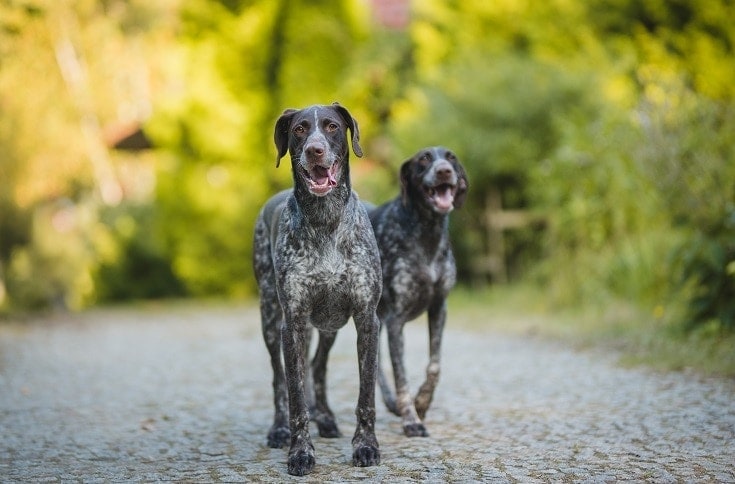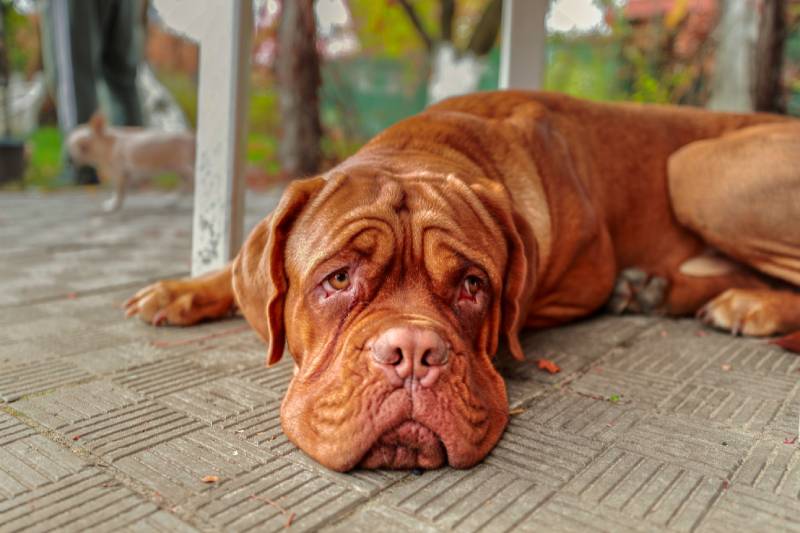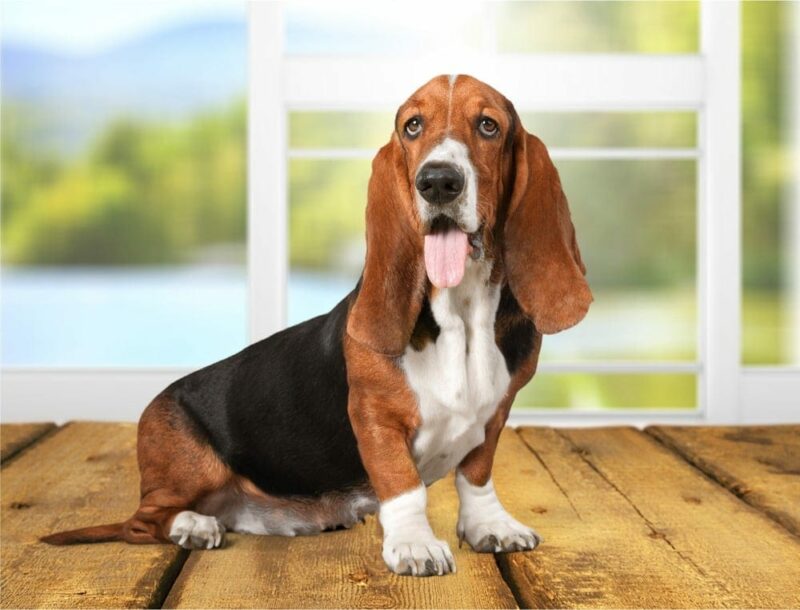Are German Wirehaired Pointers Hypoallergenic? Breed Facts & Allergy Tips
Updated on

Click to Skip Ahead
No dog is truly hypoallergenic, but there are some breeds that are more allergy-friendly than others. The German Wirehaired Pointer does not fit into this category. They tend to shed quite a lot and require regular brushing to help keep their excess hair under control. Read on below for more information.
“Hypoallergenic” Dogs
The reason someone may have an allergic reaction to a dog is due to the proteins in their skin, saliva, and urine. A dog’s fur and dander (dead skin cells and other particles) can help spread these proteins, but all dogs make them. Therefore, all dogs can cause allergies.
The idea of a hypoallergenic dog is largely a myth, as there is little in the way of scientific evidence to back it up. Studies have been done to measure the allergen levels of different dog breeds, and they have all been found to be similar. In fact, some dog breeds commonly advertised as “hypoallergenic” (like the Poodle) actually had higher-than-average allergen production. Research indicates that genetics and diet may play a role in individual levels of these proteins, which means that the future may be even brighter for dog-lovers with allergies.
If you’re allergic to dogs, that doesn’t mean you’ll never be able to own a German Wirehaired Pointer. In some cases, those with dog allergies are only allergic to specific dogs (or types of dogs). Plus, there is a lot you can do to reduce your potential allergen symptoms.

Types of Dog Proteins
Dogs make several types of proteins and many people are not allergic to all the proteins dogs make—just some of them.
The most common ones are Can f 3 and Can f 1. All dogs secrete these proteins, though they may produce them in different amounts. It can be challenging to determine if you’re allergic to a dog or not. The only way to know for sure is to hang out with the dog before bringing them home. It is also possible to become less reactive to a dog the longer you are exposed to it.
Can f 5 1 is another common protein, only produced by male, intact dogs, by the prostate; female dogs and neutered male dogs do not produce it. Therefore, if you’re only allergic to Can f 5, you should be able to own a female dog, or castrated male, without a problem.
Most allergy tests check for all of these proteins at once, making it impossible to determine which protein you actually reacted to. Therefore, if you want to check the exact proteins you’re allergic to, you’ll need to speak with your doctor about more specific testing, which may very well be worth doing.
Tips for Living with Dog Allergies
If you want to own a German Wirehaired Pointer despite your allergies, it is possible. Your best bet is to focus on choosing the right dog for you. The only way to know if you’re allergic to a dog or not is to spend time with that dog. Even fostering a dog of the same breed can help you determine if you’re allergic or not. If possible, speak to your chosen breeder about your concerns. In some cases, you may be able to spend extensive time with the puppy before bringing the dog home.
Once you’ve adopted your dog, regularly brush them to reduce the amount of hair and dander around your house. If you can have someone else do the grooming, that’s preferable. Sometimes, paying for regular grooming from a professional is worth it in this case. You can also use a grooming cloth regularly to help remove any debris that may trigger allergies.
Bathing your dog can also be helpful. Use shampoos specifically made to reduce allergens, but don’t bathe your dog too often. This can lead to dry skin and irritation, which may make your dog produce even more dander. Use a sensitive, conditioning shampoo that won’t dry out your dog’s skin with regular use.

Make your home a low allergen space
- Vacuum regularly using a machine with a HEPA filter.
- Remove (or vacuum daily) curtains, rugs and throws, which may trap excess allergens.
- Wash your pet’s toys and bedding frequently.
- Use a HEPA air purifier, especially in the areas where your dog spends the most time.
- Designate your bedroom as a dog-free zone. You spend a third of your life in your bedroom sleeping, so if you can eliminate allergens in your bedroom, you can greatly decrease your daily exposure, preventing symptoms.
- Wash your hands after interacting with your dog, and do not allow them to lick you.
Do German Wirehaired Pointers Shed a Lot?
German Wirehaired Pointers do shed. However, they don’t shed nearly as much as other dogs. They’re considered “mild” to “moderate” shedders. Therefore, while you should expect them to shed a little bit, they won’t take over your whole house.
They shed mostly in the spring and fall when they “blow their coats” for the new season. However, in warmer climates, they may shed consistently throughout the year. Their coats are dense and water-resistant, so the hair they shed is very short and not particularly invasive.
While their shedding is not as excessive as some other breeds, it’s still essential to groom them regularly to manage loose hair and keep their coat in good condition. Regular brushing can help reduce the amount of loose hair and dander in the home and prevent matting.
Additionally, routine baths and proper grooming practices can further minimize shedding and help maintain a healthy coat for your German Wirehaired Pointer.

Are German Wirehaired Pointers Low Maintenance?
While these dogs do need grooming, they are somewhat low-maintenance. GWPs have short coats, which makes grooming relatively easy compared to long-haired breeds. They shed moderately throughout the year and may require more frequent brushing during seasonal shedding.
Regular brushing helps keep their coat healthy and reduces loose hair around the house. They may also need occasional bathing, though this is far less often than brushing.
On top of grooming, these dogs need regular exercise. They are active, sporting dogs with high energy levels. Therefore, they work best for active families—they aren’t the type of dog that’ll spend a lot of time lying around, and can become frustrated if not given enough stimulation.
These dogs have hunting instincts that are quite strong and so they tend to chase smaller animals. It can be helpful to socialize them, though these instincts will never go away completely. Be aware of this tendency if you have cats or other small pets, and ensure they are introduced carefully to avoid chasing.
Conclusion
German Wirehaired Pointers are not hypoallergenic dogs, but it’s important to note that no dog is truly hypoallergenic. The term “hypoallergenic” is often associated with low-shedding dogs, which does not apply to this breed. German Wirehaired Pointers do shed quite a bit and require regular grooming to manage their excess hair.
Allergies to dogs are primarily caused by proteins found in their skin, saliva, and urine rather than their fur. While some people may be more sensitive to certain proteins, all dogs produce these allergens to some extent, making the concept of hypoallergenic dogs largely a myth. If you suffer with pet allergies, it may be a good idea to talk to your doctor about getting tested for specific canine and feline proteins, as this may open up more options for you.
Featured Image Credit: Ricantimages, Shutterstock















